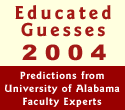 As if 2003 did not experience enough computer problems, three University of Alabama computer science professors predict there is more to come for computer viruses and SPAM in 2004.
As if 2003 did not experience enough computer problems, three University of Alabama computer science professors predict there is more to come for computer viruses and SPAM in 2004.
Dr. Phillip G. Bradford, assistant professor of computer science, and Dr. Brandon Dixon, associate professor of computer science, predict more high impact computer viruses for the coming year as computer systems become more advanced. “The individual damage of computer viruses is often minor, but the aggregate damage is significant,” Bradford said.
According to Bradford and Dixon, software patches are often given to enhance the security of systems and to combat viruses. As the number of software patches increases, the complexity and risks for more damage increase. Thanks to the emerging field of digital forensics, however, Bradford said that catching those who release computer viruses will be much easier.
As for computer SPAM and pop-up advertisements, Dr. Marcus Brown, associate professor of computer science, noted that Congress has just passed legislation that will create a “Do-not-SPAM” registry similar to the “Do-not-call” list already in use. “But it is not clear whether a U.S. law will reduce SPAM coming from outside the United States,” Brown said. “SPAM can be deleted much more easily than a hanging up on a telemarketer, but it is still irritating.”
Brown says a different option should be implemented to put a limit on spammers, like a required “stamp” on each e-mail sent. “Since the e-mails all go out for free, it’s just as easy and cheap to send out 10 million e-mails as it is to send out a few paper mail envelopes,” Brown said. “Since it’s free, if I had something to sell — and I had no ethics — I’d probably SPAM, too.”
Brown says if spammers were charged with a fee similar to a postage stamp for each e-mail sent, the amount of SPAM would be cut tremendously.
Contact
Suzanne Dowling, Office of Media Relations, 205/348-5320, sdowling@ur.ua.eduDr. Phillip G. Bradford, 205/348-6343, pgb@cs.ua.eduDr. Brandon Dixon, 205/348-0597, dixon@cs.ua.eduDr. Marcus Brown, 205/348-5243, mbrown@cs.ua.edu